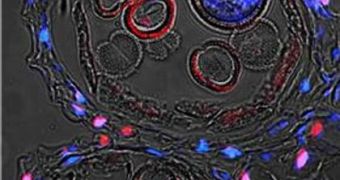Until now, the scientific community has assumed that plants, animals and humans develop different mechanisms related to cellular death, but a new paper has revealed that this is not the case. The research, published in the latest issue of the scientific journal Nature Cell Biology (October 11), highlights the fact that all these mechanisms, regardless of species, are evolutionarily related, and that they function in the same way, AlphaGalileo reports.
In order for a lifeform to function properly, it must be able to control the life cycle of its cells. These components need to be generated and destroyed at precisely timed intervals. If this does not happen, the entire organism may be at risk. One example of such a malfunction is cancer, in which cells do not respond to kill signals carried by various factors. They are, thus, allowed to continue living past their due data, and wreak havoc in their surroundings until they are destroyed by drugs, or they kill that person.
Conversely, when too many cells die, they trigger the development of mental conditions such as Parkinson's. Therefore, in all healthy people, a natural balance is kept. The new study comes from an international team of experts, featuring scientists from the Swedish University of Agricultural Sciences (SLU), the Karolinska Institute, and the universities of Durham (in the UK), Tampere (in Finland), and Malaga (in Spain). The team was coordinated by SLU expert Peter Bozhkov.
Their study revolved around the evolutionarily conserved protein TUDOR-SN. The structure was isolated from humans, mice, Norway spruce and mouse-ear cress. It was determined that, regardless of the species, this protein was degraded by proteases, a class of proteins that evolved specifically for this task. In animal cells, proteases belong to the protein group caspases. In plants, this group does not exist, but they break TUDOR-SN with the help of meta-caspases, which are believed to be the precursors of caspases. The paper also reveals that, in cells lacking TUDOR-SN, programmed cell death occurs prematurely, as opposed to the cells that feature the protein.

 14 DAY TRIAL //
14 DAY TRIAL //